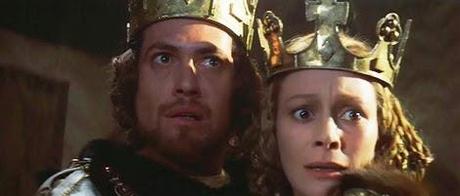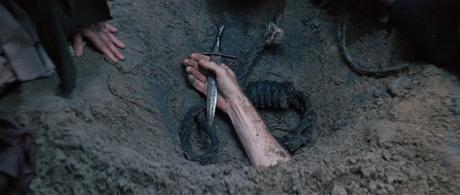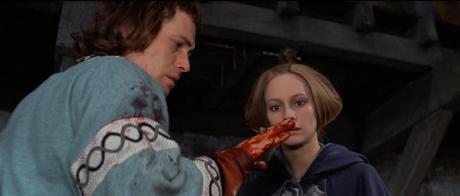 Roman Polanski made Macbeth (1971) in an extremely dark place. Depressed and guilt-ridden from Sharon Tate's murder, he channels his despair into William Shakespeare's dark tragedy of ambition. Along with Ran and Chimes at Midnight it's one of the few Shakespeare adaptations emphasizing visuals over language, very much to its benefit.
Roman Polanski made Macbeth (1971) in an extremely dark place. Depressed and guilt-ridden from Sharon Tate's murder, he channels his despair into William Shakespeare's dark tragedy of ambition. Along with Ran and Chimes at Midnight it's one of the few Shakespeare adaptations emphasizing visuals over language, very much to its benefit. Macbeth (Jon Finch) helps Scottish King Duncan (Nicholas Selby) suppress a rebellion, and is awarded the title Thane of Caldor. Goaded by three prognosticating witches and wife (Francesca Amis), Macbeth dreams of becoming King. He murders Duncan and seizes the crown, plunging Scotland into despotism. Wracked by guilt and paranoia, Macbeth can't enjoy his rule: he murders dear friends, close colleagues, even children. Steeled by the witches' prophecy that "no man born from a woman" can vanquish him, Macbeth defies rebellious squire Macduff (Terence Bayler) and his English allies.
From its opening image of the witches burying a severed hand, Macbeth presents an unremitting carnival of violence. Before the film's ten minutes old we're subjected to death by mace and mass hangings. Shakespeare's offstage murders become brutal set pieces: blood flows with each stabbing, sword cut and beheading. Banquo's ghost isn't an unearthly specter but a hemorrhaging ghost. There's a protracted home invasion-murder that can't help invoking Charles Manson. Yet it never feels excessive: Polanski's merely conveys Shakespeare's text, transcending theatrical limitations with cinematic flair.
 Macbeth's unsettling atmosphere isn't limited to bloodletting. Photographer Gil Taylor provides unsparingly bleak shots of the Scottish (actually Welsh) countryside, submerging period spectacle within relentless, crushing dourness. Polanski contrasts the Court's civilized pretensions with its unsettled landscape and pagan past. A courtly dinner's interrupted by a raging thunderstorm; Macbeth's court mixes business with bear-baiting. Macbeth abandons his stately castle for midnight consultations with a witches' coven. The capper is an eerie, discordant score by The Third Ear Band.
Macbeth's unsettling atmosphere isn't limited to bloodletting. Photographer Gil Taylor provides unsparingly bleak shots of the Scottish (actually Welsh) countryside, submerging period spectacle within relentless, crushing dourness. Polanski contrasts the Court's civilized pretensions with its unsettled landscape and pagan past. A courtly dinner's interrupted by a raging thunderstorm; Macbeth's court mixes business with bear-baiting. Macbeth abandons his stately castle for midnight consultations with a witches' coven. The capper is an eerie, discordant score by The Third Ear Band. Inevitably, Polanski and writer Kenneth Tynan (yes, that Kenneth Tynan) pare Shakespeare's text significantly, trimming scenes, conflating minor characters and turning soliloquies into voiceover narration. These alterations will rankle purists, but Macbeth flows extremely well. Though produced by Playboy, it's hardly exploitative: nudity is minimal (one scene with the witches, a discreet sleepwalking scene with Lady Macbeth) and the violence is organic to the story. Polanski only stumbles with a few ill-conceived literalizations, like the cartoon dagger that drives Macbeth to murder Duncan.
The best Shakespeare adaptations approach their oft-told tale with some fresh angle. Polanski gives us an uncharacteristically youthful Macbeth, less a conniving conspirator than young man in a hurry. Unsatisfied by praise and promotion, Macbeth won't stop until he rules Scotland - only to find he's completely out of his depth. If anything, this heightens the story: Macbeth and his wife are swept along by megalomania without appreciating the cost or consequences, making tragedy inevitable. And a disturbing coda suggests the killing's only beginning.
 Jon Finch (Frenzy) gives Macbeth dark, sexy charisma, effective as conniving usurper and guilt-ridden despot. Interestingly, Francesca Amis's Lady Macbeth isn't the snaky schemer we'd expect. She's more supportive than hectoring, dismayed by the dimensions of Macbeth's deed (and her own complicit). The supporting cast is workmanlike: actors like Martin Shaw, Nicholas Selby and Terence Bayler give solid performances, but no real standouts. Well, except Sydney Bromley's gleefully cracked porter.
Jon Finch (Frenzy) gives Macbeth dark, sexy charisma, effective as conniving usurper and guilt-ridden despot. Interestingly, Francesca Amis's Lady Macbeth isn't the snaky schemer we'd expect. She's more supportive than hectoring, dismayed by the dimensions of Macbeth's deed (and her own complicit). The supporting cast is workmanlike: actors like Martin Shaw, Nicholas Selby and Terence Bayler give solid performances, but no real standouts. Well, except Sydney Bromley's gleefully cracked porter.Ultimately, Macbeth endures not because of Polanski's notoriety or its grisly violence. So many subpar Shakespeare adaptations use the Bard's language as a crutch; why bother with camerawork or subtext? A Shakespeare film so bracingly, unapologetically cinematic is highly commendable.

